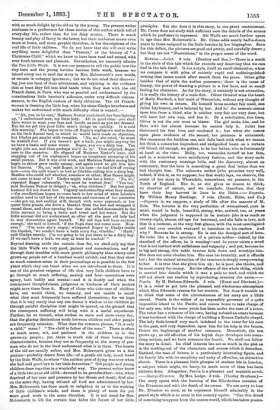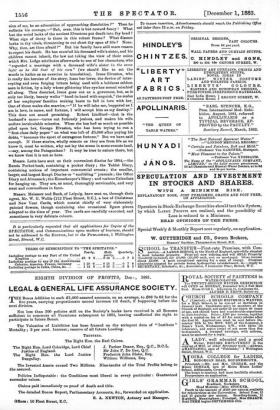NOVELL—Juliet. 3 vols. (Bentley and Son.)—There is a merit in
the style of this tale which far exceeds any deserving that we MD find in the tale itself. It has a style, itself no small distinction, when, we compare it with piles of entirely vapid and undistinguished writing that issues month after month from the press. Other gifts besides that of style the author possesses; there is the sense of beauty, the power of drawing a picture in a few lines, and no small feeling for character. As for the story, it certainly is not attractive.. It is really the history of a male flirt. Oliver Ormrod wine the heart. of Molly Murdoch, a fair maid of Wherndale, without any thought of giving his own in return. He himself loves another fair maid, one Juliet Laybonrne, and is beloved by her. And lo! the nemesis comet, upon him from a third, who is neither very fair nor very dear, but will have her own way, and has it. By a retribution, this time, Oliver is not the otie most to blame. The girl seeks him, and he flirts with her almost because he cannot help it. Juliet has discovered his first love, and condoned it ; but when she comes upon plain evidence of the second, her patience is exhausted. She renounces the faithless one, and falls back with what we cannot but think a somewhat imprudent and undignified haste on a certain old friend, old enough, we gather, to be her father, who is fortunately at hand at the time. Molly, too, reconciles herself to her fate, and in a somewhat more satisfactory fashion, and tho story ends with the customary marriage bells, and the discovery, almost as customary, that the hero is something a great deal better than we had thought him. The unknown author (who promises very well, indeed, if this is, as we suppose, her first work) lays, we observe, the scene of her story in Wherndale, somewhere, we presume, in the North of England. She is, as she gives us reason to think, an observer of nature, and we conclude, therefore, that they have their hay harvest in June in the Dales.— Eugenia. By William Money Hardinge. 3 vols. (Smith, Elder, and Co.) —Eugenia is, we suppose, a study of life after the manner of M.. Zola. The heroine is the very perfection of womanhood, pure in mind, sound in body, beautiful, strong, wise, arrived, too, at years when the judgment is supposed to be mature (she is as much as twenty-eight, almost old age for heroines), and she falls in love, and that in a moment, at the very first glance, with the most unmitigated cad that ever novelist ventured to introduce to his readers. And why ? Because be is strong. He is not the demigod sort of hero. He looks like a fine specimen of a private soldier—indeed, by the standard of the officer, he is wanting—and he never utters a word that is not instinct with selfishness and vulgarity ; and yet, because he- ist big and strong, this noble heroine falls down and worships him. She does not even idealise him. She sees his brutality, and it offends her ; but the animal attraction of the creature is simply overpowering to her. It is true that she gives him up; be is poor, she thiuks, and he must marry for money. But the offence of the whole thaw, which, is carried into details which it was a pain to read, and which we will not shock our readers by reproducing, remains the same.— Pearla. By M. Betham-Edwards. 3 vols. (Hurst and Blackett.)— It is a relief to get into the pleasant and wholesome atmosphere which Miss Edwards creates for her readers. Nor does it trouble us to think that some of the circumstances of her story are a little unreal. Pearla is the widow of an impossible governor of a quite impossible island in the Pacific, and comes home to take charge of her only son, who for some years has been under the care of a tutor. The tutor has a romance of his own, having refused an estate because it was burdened with the charge of building a Roman Catholic chapel.. The lady finds herself very much indebted to the tutor for his care- in the past, and very dependent upon him for his help in the future. Hence the beginnings of another romance. Meanwhile, the son grows up ; an old affection of his boyish days developes into some- thing serious, and we have romance the fourth. We shall not follow. the story in detail. Its chief interest lies not so much in the plot as in the working.out of the characters and scenes which it describes. Garland, the man of letters, is a particularly interesting figure, and his family life, with its simplicity and unity of affection, an attractive sketch. There is a pleasant little glimpse of student life in London, a subject which might, we fancy, be made more of than has been hitherto done. Altogether, Pear/a is a pleasant and readable novel. —George Dragon. By Mrs. Lodge. 3 vols. (Tinsley Brothers.)— The story opens with the burning of the Elizabethan mansion of the Elvastons and with the death of its owner. We are sorry to lose Mr. Elvaston so soon, as he expresses himself admirably in the grand style which is so usual in the country squire. "Can this dread of something to appear from the unseen world, which has taken posses.
sion of me, be an admonition of approaching dissolution ?" Then he collects his courage,—" Bab, man, this is but coward fancy ! What but the weird looks of the ancient Elvastons put death into thy head ? What sign of decay is there in this robust frame ? What disease lurks in thy vitals, threatening to cut short thy span of life ? None. Why, then, art thou afraid ?" But his family have still more reason to regret his death. He has married his deceased wife's sister, and his children cannot inherit, the law not taking the view of their union which Mrs. Lodge attributes afterwards to one of her characters, who "regarded a marriage with a deceased wife's sister in the same light as he did that of his own" (we shonld like to Bet the words in italics as an exercise in translation). Irene Elvaston, who is really the heroine of the story, loses her lover, the device of inter- cepting and even forging letters being used with a boldness seldom seen in fiction, by a lady whose glittering blue eye has meant mischief all along. Thus deserted, Irene goes out as a governess, but, as is only too likely, beauty walks " band-in-hand with anguish," the males of her employers' families making haste to fall in love with her One of these males she marries,—" If he will take me, beggared as I am in love, in name, and fortune, I will accept him as my destiny." This does not sound promising. Robert Lindford—that is the husband's name—turns out furiously jealous, and makes his wife endure incalculable miseries. When she has had as much as possible piled upon her, George Elvaston, who has been trying to run a "first-class daily paper" on what was left of 25,000 after paying his debts, "becomes the sport of outrageous fortune." But we have said enough. If these stories, wholly remote as they are from life as we know it, must be written, why not lay the scene in some remote land, —say, among the Patagonians ? It may be true to nature there, but we know that it is not so here.







































 Previous page
Previous page